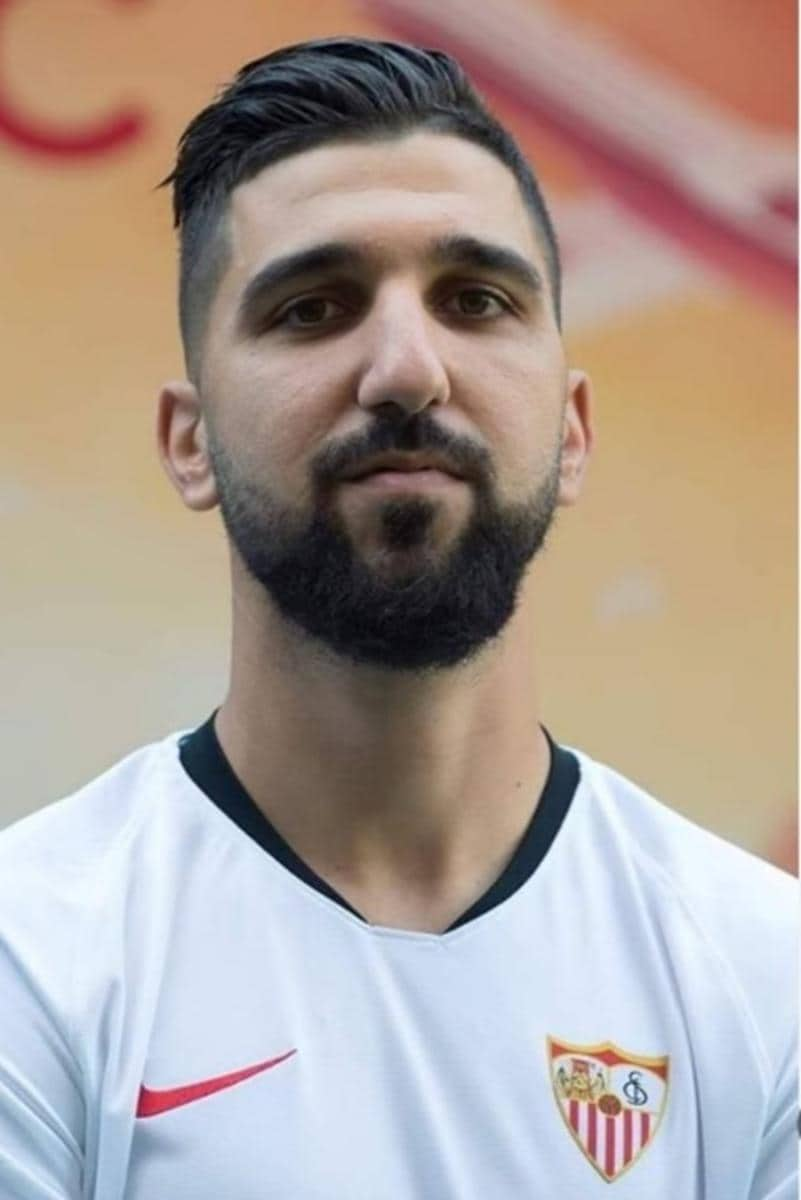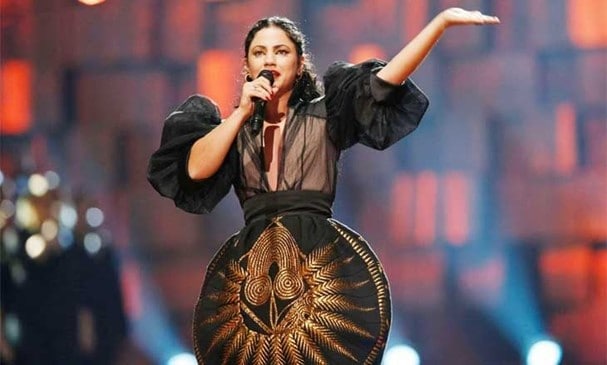15 sierpnia 2023 r. w Zjednoczonych Emiratach Arabskich odbył się mecz piłki nożnej pomiędzy jordańską drużyną Al-Wehdat a drużyną Emirati Szabab Al-Ahli Dubai. [1] Mecz wywołał kontrowersje i prawie został odwołany, ponieważ w skład drużyny Emiratów wchodzi arabski izraelski zawodnik Mu’nas Dabbur, który wcześniej grał w izraelskiej reprezentacji w piłce nożnej. Podczas gdy niektórzy jordańscy kibice Al-Wehdat wzywali do bojkotu meczu, aby uniknąć sankcji za „normalizację” z Izraelem, inni, tacy jak jordański poseł Chalil 'Atijja, wezwali kierownictwo klubu, by tego nie robiło, ponieważ byłoby to obrazą Palestyńczyków, a zwłaszcza Palestyńczyków „na terytoriach 1948”, tj. izraelskich Arabów. [2]
Niektórzy izraelscy Arabowie, tacy jak członek Knesetu Ahmad Tibi i gmina Nazareth, rodzinne miasto Dabbura, również nalegali, by jordański klub piłkarski nie bojkotował meczu, ponieważ byłoby to niesprawiedliwe nie tylko wobec piłkarza Mu’nasa Dabbura, ale wobec wszystkich Arabów, którzy są obywatelami Izraela. W swoich wypowiedziach chwalili Dabbura i podkreślali jego narodowe stanowisko palestyńskie. [3]
Po głosowaniu przeciwko bojkotowi meczu zarząd klubu wydał oświadczenie, w którym podkreślił swoje zaangażowanie w sprawę palestyńską i sprzeciw wobec normalizacji, a także wyjaśnił, że podjął tę decyzję, aby uniknąć zepsucia stosunków Jordanii z ZEA. [4] Sześciu członków zarządu klubu złożyło rezygnację – posunięcie to prezes klubu, Baszar Al-Hawamdeh, potępił jako „populistyczne” – ale kilka dni później wycofało swoją rezygnację. [5]
4 sierpnia, po wybuchu kontrowersji wokół meczu, ale zanim Al-Wehdat ogłosił, że gra będzie rozegrana, Dżawad Boulos, izraelski prawnik i dziennikarz arabski, odniósł się do tej sprawy w wydawanej w Londynie katarskiej gazecie „Al-Quds Al-Arabi”. Napisał, że skuteczne formy bojkotu Izraela – bojkot dyplomatyczny i gospodarczy – nie są już stosowane, pozostaje jedynie „bojkot kulturowy”. Oznacza to, że potężne reżimy arabskie i arabscy potentaci utrzymują więzi i stosunki handlowe z Izraelem bez przeszkód – jednak jednostki takie jak sportowcy, artyści, pisarze, poeci i członkowie różnych związków zawodowych są prześladowani przez „radykalnych aktywistów” za angażowanie się w tak zwaną normalizację kulturową z Izraelem. Cierpią z powodu tych prześladowań niezależnie od swojego stanowiska w sprawach politycznych i ich wkładu w sprawę palestyńską.
 Piłkarz Mu’nas Dabbur (Zdj.: Facebook.com/Naz.muni.official, 14 sierpnia 2023 r.)
Piłkarz Mu’nas Dabbur (Zdj.: Facebook.com/Naz.muni.official, 14 sierpnia 2023 r.)
[Ciąg dalszy tekstu – fragmenty artykułu Dżawada Boulosa – nie jest spolszczony]
„The repercussions of two local events are still plaguing us and causing doubts among us regarding the ban on cultural normalization with Israel. The first of these events was the harsh criticism that accompanied the visit of the Tunisian singer Emel Mathlouthi in the occupied Palestinian territories. She insisted on giving several performances in Ramallah and Jerusalem, but was eventually forced to cancel her show in Haifa, succumbing to pressure from elements that call for a cultural boycott of Israel.
The second event involved the Jordanian Al-Wehdat [football] club, whose management announced several days ago that it intended 'to sit out a match against the Emirati Shabab Al-Ahli team in the AFC Champions League preliminaries, due to suspicion of normalization.’ By 'suspicion [of normalization]’ it meant the participation of the Palestinian player Mu’nas Dabbur, from Nazareth, who now plays professionally for the Emirati Al-Ahli [football] club and who used to be an international player on Israel’s national team…
„Various groups of radical political activists exploited the current state of the Arabs – the deterioration of the political and social situation in most of the Arab and Islamic countries, the nonexistent or weak status of the major national movements, and the paralysis and weakening of the role of the elite – to place themselves in charge of defining the meaning of normalization and the rules for banning it. Then they claimed the privilege of handing out indulgences to people, or, [alternatively], branding them as normalizers, as happened in the recent years when these groups interfered [in various matters] and their leaders persecuted artists and intellectuals who came to Palestine to see it, study it and show solidarity with it.
SUPPORT OUR WORK
$500$250$100OTHERCryptoCurrencyApple PayPaypalCredit Card
„These 'anti-normalization committees’ specialize in preventing cultural normalization, but their leaders do not persecute the normalizers in other domains, which are actually the more important domains that have much more influence on the fate of Palestine and on the interests of the Arab peoples. The ban on normalization started on the political level, and the Arab and Muslim governments, along with their allies in the world, openly endorsed it. In the decades that followed, this political boycott [also] necessitated an economic boycott of Israel, or of the Zionist entity, as they used to call it, as well as a military and security boycott. The cultural boycott went without saying, as did the boycott on civil society bodies and associations.
„This reality no longer exists. We all know how and when the barriers were removed and when the strongholds of the boycott fell, overtly or covertly – to the point that, [today,] a stubborn adherence to the cultural boycott has apparently become the only option and the safest slogan [still available] to those who brandish [the notion of boycott] and insist on implementing it. [This option is still available] simply because it is directed at individuals – artists, writers, poets and professionals who are members of professional unions that can settle scores with them by calling them infidels and apostates. It is not directed at strong or tyrannical regimes that have not only normalized relations with Israel but have made an alliance with it. Nor is it directed at tycoons who maintain ties with their Israeli counterparts in the global markets through multinational corporations or through the banks and other mechanisms that manage the affairs of the world and its countries…
„I say, as I have repeatedly said in the past, that sometimes there is a cruel arbitrariness in the activity of these [anti-normalization] committees and their persecution of artists and culture figures, [individuals] who decide to visit Palestine in order to support its people and express solidarity with them in [Palestine itself], the land of pain and bloodshed. These committees claim that their struggle serves the interests of Palestine and its people, but if that is the case, then the interest of Palestine and its people should be the only criterion [guiding] their decisions and goals. I have read the by-laws of the boycott committees and I have discussed some of them in the past. With all due respect for whoever drafted them and their standards, whether here inside [Israel] or in occupied Palestine, in Tunisia or in Amman, they are full of slogans, contradictions and vague criteria that are open to interpretation and questioning…
„Far from all these slogans and theorizing, I believe that anyone who comes to visit us, if he supports us without reservations or conditions, curses the occupation and its troops, and does not pander to Israel and its institutions [but rather] gives us hope and a glimmer [of light]… and wipes away the tears of our children with all his heart, [then] he cannot be regarded as a normalizer and stricken from our lexicon. On the contrary, [such a person] is a pure-hearted fighter and a supporter of justice, in both word and deed. That is true of the Tunisian [singer] Emel Mathlouthi, who came to Jerusalem with rivers of yearning and love in her heart. She carried the flag of Palestine in her right hand, and thrust the finger of her left hand into the eye of the enemy…
 Tunisian singer Emel Mathlouthi (Al-quds.co.uk, August 3, 2023)
Tunisian singer Emel Mathlouthi (Al-quds.co.uk, August 3, 2023)
„I do not know who drafted the clauses banning cultural normalization with Israel, whether in Tunisia or in Palestine. But I am sure that, if the goal is to [serve] the interest of Palestine and its people, then the Tunisian [Emel Mathlouthi] achieved it [here] among us. Palestine and its people love her, even though I was sad that she preferred to cancel her performance in Haifa… the sister-city of Jerusalem and Ramallah…
„Five years ago, [Egyptian football] player Mohamed [Mo] Salah was quoted as saying that he would leave his team, Liverpool, if its management decided to sign on [the Arab Israeli] player Mu’nas Dabbur. His reason was the same as the reason given by the management of the Jordanian Al-Wehdat team. I can obviously understand Salah’s doubts… and the reservations of the Al-Wehdat [football] club regarding Dabbur, who played on the Israeli team, and their desire to clarify some technical and professional details. But I cannot understand their position if it leads to boycotting Dabbur or any team on which he plays. At the time I wrote an open letter to Mohamed Salah, trying to allay his doubts about us, the Palestinians who are citizens of Israel, and about the Palestinian and Islamic identity of Mu’nas Dabbur. I also tried to explain some things he did not know about our complicated and uncertain reality.
„What I said at the time to Mohamed Salah is now even more relevant to say to my brothers in the Al-Wehdat [football] club… [Most] Arabs do not know our story [as people] rooted in our homeland… But you [Jordanians] are our brothers on this soil, and must know all the chapters of the [Palestinian] story. Perhaps [Jordanian] MP Khalil 'Attiya reminded you of them several days ago… when he said: 'Like others who are committed to the progress of the Al-Wehdat club, I was concerned by the reports that it might boycott its matches with an Emirati team due to the participation of Palestinian player Mu’nas Dabbur… Dabbur is an Arab Palestinian [whose roots] go back generations, and he cannot possibly [be accused of] serving the Israeli enemy or harming our people within the 1948 territories of occupied Palestine [i.e., the Israeli Arabs]. Footballer Mu’nas Dabbur, like others, is a Palestinian star within the [Zionist] entity, with a good professional record as an athlete and with national positions that are known and documented, [vii] [but] were erased [by his detractors] when he stopped playing on the enemy’s teams and became a leading player in an Arab team…
„The statement issued by MP Khalil 'Atiyya corrected most of the misconceptions. He emphasized the complicated reality of young Palestinians inside Israel, the problem of their conflicted identity and the constant conflict between their [Israeli] citizenship and their [Palestinian] nationality. What MP 'Attiya wrote was very important, and came at the right time, just as we were reading the saddening and worrying positions of certain ideologues who addressed the issue of normalization and the definition of Mu’nas Dabbur’s citizenship and his flawed national identity. [But these ideologues] themselves work for associations, bodies and research institutes that are funded by elements that create normalization and are allied with Israel, and some are even thought to be its close partners in planning the persecution of the Palestinians and their cause. They are agents of indirect normalization…
„We in Palestine have learned… to be realistic…, to listen to our intuition, and to beware populists and biased people who cloak themselves in a phony culture. I welcome the Tunisian [singer] and congratulate the Al-Wehdat [team].”
[1] The-afc.com, August 15, 2023.
[2] Raialyoum.com, August 1, 2023.
[3] Facebook.com/Tibi.Fans, August 13, 2023; facebook.com/Naz.muni.official, August 14, 2023.
[4] Facebook.com/wehdatclubjo, August 10, 2023.
[5] Raialyoum.com, August 14, 2023; ammonnews.ne, August 17, 2023.
[6] Al-Quds Al-Arabi (London), August 4, 2023.
[7] In May 2021, following violent riots that took place in the Al-Aqsa mosque in Jerusalem, Dabbur shared on social media a photo of Al-Aqsa with a quote from the Quran (14:42): ” And never think that Allah is unaware of what the wrongdoers do. He only delays them for a Day when eyes will stare [in horror].” He explained that this was meant as criticism of the „harming” of Al-Aqsa and the excessive use of force by the Israeli police. His post sparked angry reactions, including from fans of the Israel’s national football team, who regarded them as support for Palestinian violence. Dabbur left the Israeli team in July 2022.








